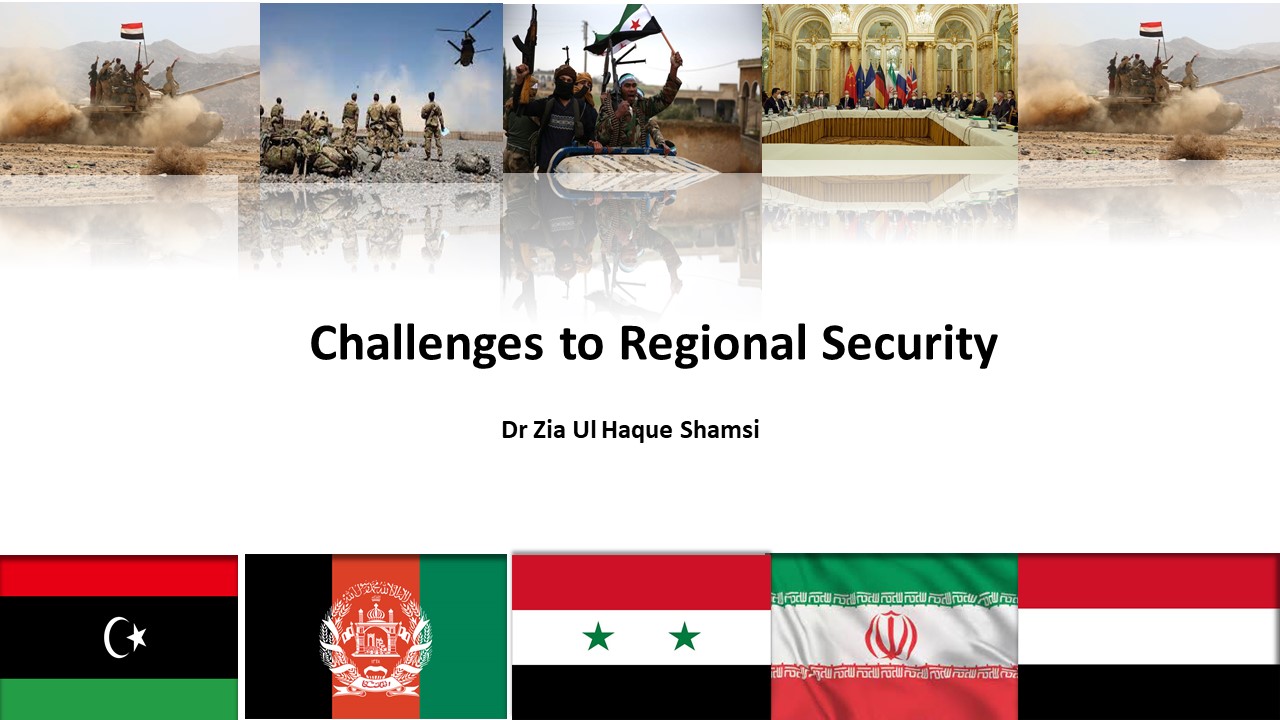Since the end of Cold War, most wars have taken place either in the Middle East or the adjacent South Asian region. Unfortunately, all of these wars and conflicts were between the Unequal Military Powers (UMPs), and therefore, the result was obvious. The infrastructure and the social fabric of Iraq, Libya, Syria, Yemen, and Afghanistan has been destroyed, and hundreds of thousands of innocent people killed, while millions have been rendered homeless and forced to leave their homes to take refuge in foreign lands.
Iran, on the other hand, remains under US sanctions due to its nuclear programme which not only concerns extra-regional powers but also regional states. Saudi Arabia has repeatedly voiced its concerns about increased nuclear activities by Iran which threatens regional security. Saudi officials have stated that “Iran’s moves to produce uranium enriched to 60% fissile purity and uranium metal to 20% ‘represent an increasing threat’ to regional security and non-proliferation of weapons.” According to a recently published International Atomic Energy Agency (IAEA) report on Iran, the country is producing more Uranium metal in violation of its commitment under the Joint Comprehensive Plan of Action (JCPOA). This is hampering efforts to secure “a comprehensive nuclear deal that ensures global and regional security and stability.”
The situation in the region, Middle East and South Asia (MESA), calls for comprehensive intra-regional dialogue, perhaps at the Summit level.
Afghanistan remains under the clouds of uncertainty in spite of the complete withdrawal of foreign forces. In fact, one may recall that the US signed a Peace Agreement with Taliban in Doha on 29 February 2020, under which all its forces were supposed to withdraw from Afghanistan in 14 months. However, President Biden sought a little more time to complete the process and finally all US and NATO troops left Afghanistan by middle of August, and Taliban entered Kabul without firing a shot on 15 August 2021. Though not an unexpected outcome, it is taking a little more time than expected for regional as well as extra-regional countries to recognize the new Afghan government led by Taliban. This is unfair for the people of Afghanistan who have already suffered immensely due to repeated foreign occupations and continued wars and conflicts over the last four decades. Delay in recognition is especially problematic since the US leadership (and that of other countries) should have foreseen that Taliban would ultimately take over Afghanistan after foreign troops left the country they had controlled by force only.
The people of Afghanistan are starving due to lack of basic amenities which are not available to them due to absence of requisite resources. In spite of Pakistan’s best efforts to provide humanitarian assistance in the form of food and medicines, Afghans are going through a appalling time due to extremely harsh weather and lack of international support at this critical time. The new Taliban government does not have enough resources to manage the state’s affairs due to US restrictions on the release of funds necessary to provide relief to the people of Afghanistan. Perhaps, the US Administration is taking revenge of its military defeat from the Taliban government without any consideration for the plight of the people of Afghanistan for which the US cannot be absolved under any pretext.
Moving to the Middle East, the war in Yemen has entered its 8th year. Yemen, like Syria, is a classic example of a civil war turning into a larger regional conflict. Without going into the historical past of Yemen’s civil war, the ongoing military conflict started in 2014 when Saudi-led regional forces intervened to reinstall the government of Abdrabbuh Mansur Hadi who had fled out of Yemen due to resurgent Houthi’s advances on the capital Sana. Although the Saudi-led offensive achieved its primary objective of restoring Hadi’s government, but the conflict developed into full-scale war. The people of Yemen are now faced with famine and large-scale internal displacement and the end of the crisis is not in sight. Houthis have been carrying out missile and rocket attacks on Saudi oil facilities regularly but on 17th January, they claim to have carried out a drone strike against oil facilities near Abu Dhabi. Not surprisingly, UAE has pledged to retaliate in kind.
While Libya remains unstable, there is no respite for the Syrians also. Growing out of the consequences of the Arab Spring in early 2011, the Syrian conflict has had a much wider impact on regional security. The number of regional and extra-regional states and non-state actors involved in the Syrian conflict, perhaps outnumbers all other regional conflicts, including Libya, Yemen, and even Afghanistan. That is why the Syrian conflict remains unresolved even after continued fighting for over a decade now.
The challenges to regional security in the MESA region are of serious nature and need to be looked into at the Summit level. Regional stakeholders must take charge before extra-regional forces intervene again militarily, especially since their political intervention is unlikely to be blocked due to their long-term interest in the region.
Key Words: Middle East, Afghanistan, Iran, South Asia, Security
Dr Zia Ul Haque Shamsi is the author of ‘Nuclear Deterrence and Conflict Management Between India and Pakistan’ (2020) and ‘South Asia Needs Hybrid Peace’ (2021). He is presently working as Director at the Centre for Aerospace & Security Studies (CASS), Islamabad, Pakistan. The article was first published in Daily Times. He can be reached at cass.thinkers@gmail.com.
Image Source: Etfa Khurshid Mirza




